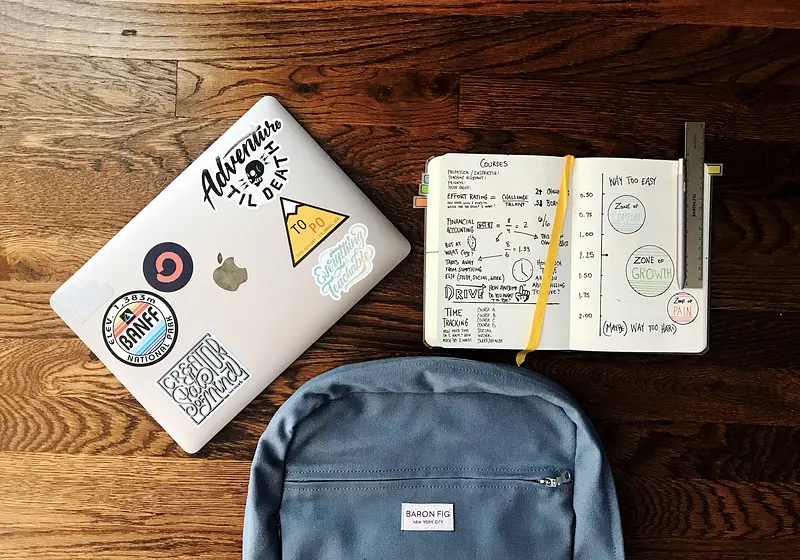Not everybody's good at studying, or organising things into categories, or remembering to make flashcards, or a million of other things. Studying isn't for everyone. But there are a few helpful tips that can set you on the right path...
Let us slide into your dms 🥰
Get notified of top trending articles like this one every week! (we won't spam you)1. Start early.
If you leave all your studying to the night before an exam, you won't be able to rememeber anything. On the other hand, if you start months before, you'll have plenty of time to let your brain soak up everything you need to know. All you have to do is start doing ten, twenty minutes of studying every day, and then ramp it up slightly as you get closer to exams. At first, it'll seem like you're not learning anything, but I promise that if you do it for long enough, you'll learn things without even realising it.

Take the Quiz: Which college major suits you?
Find out which college major aligns perfectly with your passions, strengths, and future dreams!
2. Timetables!
Before you start to study at home, you need to know what you're going to begin with. If you rush in and do anything, you run the risk of missing something out. Make a list of all the topics you have to look at, and decide how much time you want to spend on each.
Then, make a timetable of your week. You can make this as simple or complicated as you want, as long as it works for you, and indicates when you're free and when you're not. Pick a slot each day that doesn't clash with anything else.
3. Pick the things you don't know.
Often, it can be tempting to 'study' by just looking over things you already know. This isn't going to get you anywhere, despite making you feel better. A good idea is to rank all your topics from best to worst, and start your studying with the worst one. This might seem horrible now, but when exams come round, you'll thank yourself for how much time you spent on it.
4. Colour code.
A lot of people (myself included) are very visual, which means that having a colour system for yourself can be very useful. For one, it makes it much more interesting to read notes than if they were simply lines and lines of black pen. You can either pick specific colours for certain things (red for events, green for dates, blue for quotes, etc.) or just write things down in lots of different colours, as long as you think it will actually help you. Another good idea is to use colours, or stickers, to rank each thing you do.
If you've learnt it really well, green. If you have no idea, red. If you're in the middle, orange. That way you can rule out the things you already know and focus on the rest.
5. Don't spend ages making your notes pretty.
I know this is tempting, especially when using colours, but essentially it's just another form of procrastination. While making your notes all neat and pretty might look less cluttered, it won't have any real effect on your studying. Messy, jumbled notes are fine, as long as you can understand them. Any time you use trying to improve the appearance of your notes and resources is time wasted!
6. Find your own space.
Ideally, you don't want to study in the same place you do other things, otherwise you risk getting distracted. Because of this, try to find a little corner of space to devote simply to school-work. I know this isn't possible for everyone, but as long as you have a small place to focus entirely on studying, then you're all good. Clear out your desk, and put everything in one place so that you know where to look, and you won't have to waste time getting up and finding things.
7. Try a variety of study techniques.
Always doing one thing will end up boring you, and you won't remember anything. Also, there are loads of study techniques, and everybody has a way that works best for them. You might not have found yours yet, so it's good to experiment. Try chunking items, using mneumonics, mindmaps, flashcards, timelines, or anything else you might have heard of, and want to try.
8. Post-its!
Post-its are your best friend during the exam season. When you see something every single day, you end up remembering it. So if you really just can't memorise something, write it down on a post-it, or make some sort of poster, and stick it somewhere you'll see it each day (next to your bathroom mirror, over your bed, above your desk, etc.). That way you'll remember it within a week.
9. Use the internet.
There are so many resources out there, for all subjects and topics, and some people spend so much time and effort making things online that might help you more than you think. Look things up, print stuff out, watch summary videos and make notes to refresh your memory. Whatever you do, make sure you don't miss out on something that could really help you, just because you couldn't be bothered to look.
10. Teach others.
One of the best ways to know if you've learnt something is to teach it to someone else. It might be a family member, or a friend who's also preparing for an exam, but just saying it all out loud will give you a real sense of how comfortable you feel with the topic, and how much you know. You can narrow down your weak points, and repeat the 'lessons' again and again until you've got everything. Also, saying things out loud is known as elaborative rehearsal, which means the more you talk, the more you'll remember!
11. Practice papers!
Practice papers are so useful. You can study with flashcards and mindmaps all you want, but you also need to know how to actually answer the question. Some exam questions have very specific structures you need to follow, which you can find online, or at school, but you'll need to practice them again and again if yu want to get really good at them.
12. Take breaks.
Your brain won't function properly if you're staying in the exact same spot and studying for hours on end. Schedule a few minute break in the middle, giving yourself time to get up, stretch your legs, maybe eat some food, be hydrated, check your phone, whatever you need. As long as you're having a small time out every now and then, I promise you won't feel too overwhelmed.
13. But don't get distracted!
Breaks are really good for you, but you need to make sure that a five minute time out doesn't turn into a couple of hours on your phone. Stay focused and concentrated. If it will help, turn off all your devices beforehand, and make sure you're in a space with no distractions.
14. Don't forget to live.
Studying is really important, but it's not the most important thing in your life. Don't let it overwhelm you and take over everything. Keep it to free hours at home, and make sure you leave yourself time to go out with your friends, or have a movie night, or spend time with your family. Your physical and mental health are really important, especially whren you're under so much stress, so make sure to keep eating, drinking, and moving around, as well as staying happy.
15. Finally, believe in yourself!
Exams are scary, and studying is hard. But all you can do is try your best, and see what happens. First and foremost, you're doing this for yourself, so stay happy, and believe that you can do it. As soon as that happens, everything else will become a lot easier.

















